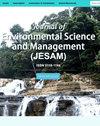菲律宾Iloilo的Ati和Suludnon农民的土著做法和气候变化应对措施
IF 0.3
4区 环境科学与生态学
Q4 ENVIRONMENTAL SCIENCES
引用次数: 7
摘要
气候变化已成为菲律宾许多农民生计的主要威胁,特别是土著群体。人们已经认识到,传统知识是适应气候变化的重要信息来源,因为传统知识中包含了代代相传的应对策略。本研究通过对关键信息者的访谈、焦点小组讨论和农场访问记录了伊洛伊洛的苏鲁德农和阿蒂族适应气候变化的土著知识。自2003年以来,他们的社区经历了气候变化,表现为强台风、山体滑坡以及各种形式的作物和人类疾病。他们对气候变化的反应包括基于生物多样性的种植制度、改变种植日历、使用本土品种、消费非传统/野生食品、本土预警系统和多样化的收入来源。这两个土著群体都是政府和非政府项目、赠款和农业培训的受益者,他们在这些项目中学习了新的农业技术。传统做法与精选农业技术的采用相结合,帮助Suludnon和Ati群体在气候变化对其生活的不利影响中成为可持续的、适应气候变化的农业社区。本文章由计算机程序翻译,如有差异,请以英文原文为准。
The Indigenous Practices and Climate Change Responses of Ati and Suludnon Farmers in Iloilo, Philippines
Climate change has become a major threat to the livelihoods of many farmers in the Philippines, particularly among the indigenous groups. It has been recognized that traditional knowledge is an important source of information for climate change adaptation, for embedded into it are coping strategies evolved through and passed on to generations. This study documented through key informant interviews, focus group discussions and farm visits the indigenous knowledge for climate change adaptation of the Suludnons and Ati in Iloilo. Since 2003, their communities experienced climate change as manifested by strong typhoons, landslides, and the various forms of crop and human diseases. Their responses to climate change include biodiversity-based cropping systems, changes in cropping calendar, use of indigenous varieties, consumption of non-traditional/wild foods, indigenous warning systems and diversified income sources. Both indigenous groups are beneficiaries of government and non-government projects, grants and agricultural trainings where they learned new farming technologies. The traditional practices combined with the adoption of selected agricultural technologies have helped the have helped the Suludnon and the Ati groups become become sustainable and climate-resilient farming communities amidst the adverse impact of climate change on their lives.
求助全文
通过发布文献求助,成功后即可免费获取论文全文。
去求助
来源期刊

Journal of Environmental Science and Management
ENVIRONMENTAL SCIENCES-
CiteScore
0.90
自引率
0.00%
发文量
10
审稿时长
2 months
期刊介绍:
The Journal of Environmental Science and Management (JESAM) is an international scientific journal produced semi-annually by the University of the Philippines Los Baños (UPLB).
JESAM gives particular premium to manuscript submissions that employ integrated methods resulting to analyses that provide new insights in environmental science, particularly in the areas of:
environmental planning and management;
protected areas development, planning, and management;
community-based resources management;
environmental chemistry and toxicology;
environmental restoration;
social theory and environment; and
environmental security and management.
 求助内容:
求助内容: 应助结果提醒方式:
应助结果提醒方式:


